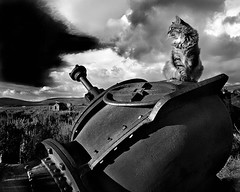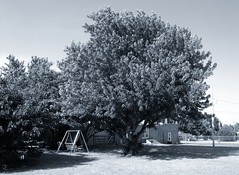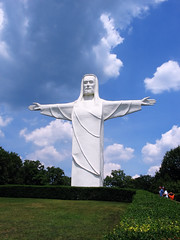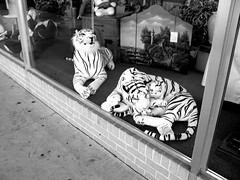TOPEKA, Kan., May 5 - Six years after Kansas ignited a national debate over the teaching of evolution, the state is poised to push through new science standards this summer requiring that Darwin's theory be challenged in the classroom.
In the first of three daylong hearings being referred to here as a direct descendant of the 1925 Scopes Monkey Trial in Tennessee, a parade of Ph.D.'s testified Thursday about the flaws they saw in mainstream science's explanation of the origins of life. It was one part biology lesson, one part political theater, and the biggest stage yet for the emerging movement known as intelligent design, which posits that life's complexity cannot be explained without a supernatural creator.
Darwin's defenders are refusing to testify at the hearings, which were called by the State Board of Education's conservative majority. But their lawyer forcefully cross-examined the other side's experts, pushing them to acknowledge that nothing in the current standards prevented discussion of challenges to evolution, and peppering them with queries both profound and personal.
"Do the standards state anywhere that science, evolution, is in any way in conflict with belief in God?" the lawyer, Pedro Irigonegaray, asked William S. Harris, a chemist who helped write the proposed changes.
When a later witness, Jonathan Wells, said he enjoyed being in the minority on such a controversial topic, Mr. Irigonegaray retorted, "More than being right?"
If the board adopts the new standards, as expected, in June, Kansas would join Ohio, which took a similar step in 2002, in mandating students be taught that there is controversy over evolution. Legislators in Alabama and Georgia have introduced bills this season to allow teachers to challenge Darwin in class, and the battle over evolution is simmering on the local level in 20 states.
While the proposed standards for Kansas do not specifically mention intelligent design - and many of its supporters prefer to avoid any discussion of it - critics contend they would open the door not just for those teachings, but to creationism, which holds to the Genesis account of God as the architect of the universe.
For Kansas, the debate is déjà vu: the last time the state standards were under review, in 1999, conservatives on the school board ignored their expert panel and deleted virtually any reference to evolution, only to be ousted in the next election.
But over the next few years anti-evolution forces regained the seats. And now, the board's 6-to-4 anti-evolution majority plans to embrace 20 suggestions promoted by advocates of intelligent design and are using this week's showcase to help persuade the public. "I was hoping these hearings would help me have some good hard evidence that I could repeat," Connie Morris, an anti-evolution board member, said in thanking one witness.
Sighing was Cheryl Shepherd-Adams, a physics teacher who took an unpaid day off from Hays High School to attend the hearings. "Kansas has been through this before," she said. "I'm really tired of going to conferences and being laughed at because I'm from Kansas."
The proposed changes to the state's science standards would edit everything from the introduction to notes advising teachers on specific benchmarks for individual grades. Perhaps the most significant shift would be in the very definition of science - instead of "seeking natural explanations for what we observe around us," the new standards would describe it as a "continuing investigation that uses observation, hypothesis testing, measurement, experimentation, logical argument and theory building to lead to more adequate explanations of natural phenomena."
Local school districts devise curriculums in Kansas, as in most other states, but the standards provide a template by outlining what will be covered on the statewide science tests, given every other year in grades 4, 7 and 10.
Even as they described their own questioning of evolution as triggered by religious conversion, the experts testifying Thursday avoided mention of a divine creator, instead painting their position as simply one of open-mindedness, arguing that Darwinism had become a dangerous dogma.
"There is no science without criticism," said Charles Thaxton, a chemist and co-author of the 1984 book "The Mystery of Life's Origin: Reassessing Current Theories."
"Any science that weathers the criticism and survives is a better theory for it," Mr. Thaxton said.
But the debate was as much about religion and politics as science and education, with Mr. Irigonegaray pressing witnesses to find mentions of the theories they were denouncing, like humanism and naturalism, in the standards, and asking whether they believed all scientists were atheists. He largely ignored their detailed briefings to ask each man if he believed Homo sapiens descended from pre-hominids (most said no) and how old he thought earth was (most agreed on 4.5 billion years.)
"These people are going to obfuscate about these definitions," complained Jack Krebs, vice president of the pro-evolution Kansas Citizens for Science, whose members filled many of the 180 auditorium seats not taken by journalists, who came from as far away as France. "They have created a straw man. They are trying to make science stand for atheism, so they can fight atheism."
Convened 80 years, to the day, after John Scopes was arrested for teaching Darwin's theory to his Dayton, Tenn., high school class, the hearings were cut back from six days when the evolutionists decided not to present witnesses.
Beaming from a laptop to a wide screen, the scientists showed textbook pictures of chicken, turtle and human embryos to try to undermine the notion that all species had a common ancestry. Diagrams of complex RNA molecules were offered as evidence of a designed universe. Dr. Harris displayed a brochure for his Intelligent Design Network, which is based in Kansas, depicting a legal scale with "design" and "evolution" on each side and the words "religion" and "naturalism" crossed out in favor of "Scientific Method."
"You can infer design just by examining something, without knowing anything about where it came from," Dr. Harris said, offering as an example "The Gods Must be Crazy," a film in which Africans marvel at a Coke bottle that turns up in the desert. "I don't know who did it, I don't know how it was done, I don't know why it was done, I don't have to know any of that to know that it was designed."
Across the street, where the evolutionists tried to entice reporters with sandwiches and snacks, Bob Bowden, an agricultural researcher at Kansas State University, denounced the hearings as a "kangaroo court."
"When the power shifted on that board, we knew on that day that we lost," said Dr. Bowden, who has children in the 7th and 12th grades. "It's bogus."
But Linda Holloway, a member of the 1999 state board that dumped evolution, said the mainstream scientists' failure to participate in the hearings signaled that "they're afraid to be cross-examined, they're afraid to defend their theory."
Erika Heikl, 16, one of 14 students from Bishop Seabury Academy, a Christian school in Lawrence, Kan., who attended the hearings, said she believed in evolution - and that the standards should be changed to include its detractors.
"Your views won't change just from being taught that," Erika said. "You'll understand it more."





